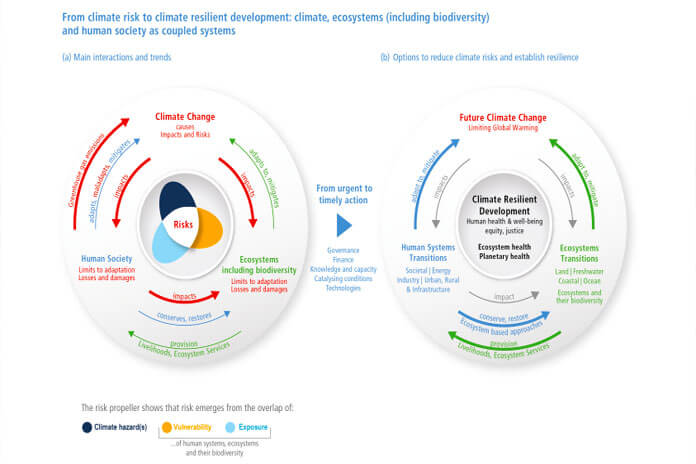BELIZE CITY, Mon. Feb. 28, 2022– Yesterday, 195 member governments approved the Summary for Policymakers of the 2022 IPCC Working Group II report entitled, “Climate Change 2022: Impacts, Adaptation, and Vulnerability”. Since February 14, member governments have been engaged in a virtual approval session of the document that highlights directly the interaction between the climate crisis and its impact on ecosystems, biodiversity, and human society.
The report highlights unequivocally the impact of human society on our biosphere and systems of life, and it shows that the people of the global south, which have contributed the least to greenhouse emissions, are not in a position to cope with the impact of climatic change and loss/damage of biodiversity and systems of life.
The chairperson of the IPCC, Hoesung Lee, in a press release today, said, “This report is a dire warning about the consequences of inaction. It shows that climate change is a grave and mounting threat to our wellbeing and a healthy planet. Our actions today will shape how people adapt and nature responds to increasing climate risks.”
The gaps between action taken and action needed to prepare nations for the impacts of climate change are ever widening: calls for increased ambitions by vulnerable nations are constant, commitments made by developed countries are lacking, and those low-income populations continue to be the most affected by the disparity.
“Increased heatwaves, droughts, and floods are already exceeding plants’ and animals’ tolerance thresholds, driving mass mortalities in species such as trees and corals. These weather extremes are occurring simultaneously, causing cascading impacts that are increasingly difficult to manage. They have exposed millions of people to acute food and water insecurity, especially in Africa, Asia, Central, and South America, on Small Islands and in the Arctic,” the release from the IPCC states.
Transforming vulnerable states into climate-resilient states will take action from governments; adequate financing, knowledge and capacity-building, technology, and catalyzing conditions, the report says. Without advancements in these areas quickly, countries, especially those at greatest risk, may suffer from loss and damage that is irreversible.
Risk is defined by the report as, “the potential for adverse consequences for human or ecological systems, recognizing the diversity of values and objectives associated with such systems.”
127 key risk areas are identified in the report, which emphasizes that climate change is a global challenge that requires local solutions and clearly outlines a narrowing window for action, while emphasizing the challenges of climate-resilient development at this stage, and how this will be increasingly difficult if the global temperature increase were to exceed 1.5°C (2.7°F).
The release states, “In some regions, it will be impossible if global warming exceeds 2°C (3.6°F). This key finding underlines the urgency for climate action, focusing on equity and justice. Adequate funding, technology transfer, political commitment, and partnership lead to more effective climate change adaptation and emissions reductions.”
In his remarks CO- Chair Hans-Otto Pörtner said, “The cumulative scientific evidence is unequivocal: Climate change is a threat to human well-being and planetary health. Any further delay in concerted anticipatory global action on adaptation and mitigation will miss a brief and rapidly closing window of opportunity to secure a liveable and sustainable future for all.”
Countries like Belize, which is a part of the Caribbean and Latin America, are at a high risk of irreversible climatic impact. Since the country sits in the hurricane belt, and is a lowlying nation, the impact of a major hurricane, would be devastating. The IPCC calls on countries to utilize its Summary for Policy Makers to guide decision-making on the climate front to ensure that nations are able to withstand the onslaught of climatic impacts. The 37-page summary provides key findings of Working Group II reports that, as mentioned, have been approved by the IPCC member governments.
A technical report containing extended key findings and the full 3,675-page report can be found and downloaded on the IPCC website at https://report.ipcc.ch/ar6wg2/pdf/IPCC_AR6_WGII_FinalDraft_FullReport.pdf.

